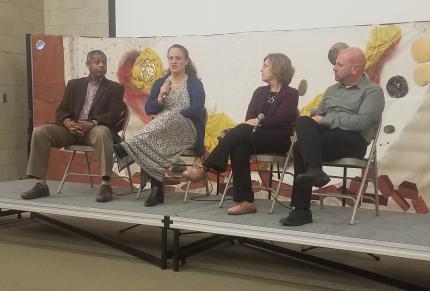Speakers Address ‘Contentious’ Conflict between Israel and Palestine

Left to right: Reggie Smith, Mae Elise Cannon, Jessica Montell, and Sami Awad
Chris Meehan
In his introduction to a program featuring three human-rights advocates working for peace between Israel and Palestine, Reggie Smith said they would be offering a personal look at the process and challenges of trying to bring peace “in a very contentious part of the world.”
“Peace is happening, but not as quickly as people would like to see,” said Smith, director of the Christian Reformed Church offices of Social Justice and Race Relations, which helped to sponsor the event, “Pilgrimage to Peace: Justice and Peace in Israel and Palestine,” Oct. 28 at Church of the Servant CRC in Grand Rapids, Mich.
The local chapter of Kairos, an organization that supports the right for both Israel and Palestine to exist in peace, was also a cosponsor.
First to speak was Mae Elise Cannon, executive director of Churches for Middle East Peace, a coalition of nearly 30 denominations and organizations, including the Christian Reformed Church in North America. CMEP is based in Washington, D.C., and works to encourage U.S. policies that promote a resolution to conflicts in the Middle East with a focus on the Israeli-Palestinian conflict.
The author of several books, including Social Justice Handbook: Small Steps for a Better World, Cannon said,“The conversation on so many issues today is becoming increasingly divided in Washington, D.C.”
Recently she was part of a group that met with members of the team assembled by Vice President Mike Pence to address U.S. efforts to bring peace to Israel and Palestine. Meeting with that group only highlighted how far apart the pro-Israel and pro-Palestine sides are.
While Kairos and CMEP are hoping for a solution that will allow both Palestine and Israel to exist in peace, the vice president’s delegation was more one-sided.
Pence’s team supports Jerusalem’s becoming the capital of Israel. It has pushed for a cut of more than $270 million in aid to Palestinians and was fully behind President Trump’s order to close the Palestinian mission in Washington, D.C.
“I came away believing that [those creating U.S. policy] sincerely think they are going about this in the right way,” said Cannon.
“But U.S. policy plays a very critical role in whether the peace process occurs. So far, the U.S. president has made decisions that make peace even more difficult. How can we have peace when you are completely shutting out the Palestinians?”
Although it faces continuous setbacks, the movement toward peace is seeing small victories, said Cannon.
In early October, for example, Lora Alqasem was stopped at Ben-Gurion International Airport in Tel Aviv, Israel, and detained for 16 days because authorities said she was involved in a group that calls for an international divestment of funds from Israel. But the Supreme Court of Israel recently intervened and allowed the Florida woman to enter Israel to attend school at Hebrew University. “It was an important win,” said Cannon.
Jessica Montell, executive director of HaMoked: Center for the Defence of the Individual, agreed. Her organization takes on cases involving the violation of human rights in Israel and Palestine.
Since 1988, HaMoked has helped to halt punitive home demolitions, has brought families together, and has assisted more than 100,000 people in obtaining travel permits that were denied. The group also joined with five other groups in persuading Israel’s top court to open an important border crossing so that goods could be delivered to Gaza.
Most of their clients are Palestinians who face any number of human rights restrictions and abuses, Montell said.
“I live in West Jerusalem and enjoy rights and experiences that you in the U.S. experience,” said Montell, who is Jewish. “I can say whatever I want. Life in Israel is very comfortable economically in contrast to those who have lived under occupation for 51 years.”
Not too long ago, she said, she could walk fairly freely in Jerusalem, but checkpoints now make that next to impossible.
She also sees many other disturbing trends: attacks on the press, restrictions on Arab Israeli citizens to speak out and organize, and even greater difficulties for people to leave or enter the wall-enclosed Palestinian settlements of the West Bank and Gaza.
Sami Awad, a Palestinian Christian, is director of the Holy Land Trust, which in the face of violence is training community members on the principles of nonviolence as the way forward for peace.
His organization also hosts groups, such as those from the CRC , that want to visit and learn more about Israel and Palestine. The office of Social Justice offers information on the Holy Land Trust and other organizations offering tours of sites in Israel and Palestine.
Awad, who lives in Bethlehem, said life in Gaza is becoming worse all of the time. People have no electricity, little water, and a scarcity of health care. Unemployment is rampant, he said.
Looking over all of the dialogue that has occurred between various parties seeking peace in the area over the past several years, Awad said he believes the talking has gone nowhere.
Looking ahead, he is trying to be hopeful and said he and Cannon and Montell are on a two-week trip to churches in the U.S. to seek their support for peace.
“We need a new theology developed to promote equality and rights for all people in Israel and Palestine. I’d like to see churches in the U.S. help bring a model of peace to the Holy Land that can be a model for other parts of the world,” said Awad.


